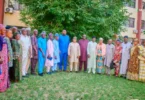The Convener of Ihe Abia, Dr. Emeka Okpara has called on the governors of the South East to partner with the South East Development Commission, SEDC, and develop the South East into a regional economic hub in West Africa.... CLICK TO READ THE FULL NEWS HERE▶▶
Okpara said this and more while answering questions from journalists concerning the establishment of the SEDC.
President Ahmed Bola Tinubu recently signed the South East Development Commission bill into law, and the people of the South East are divided over the propriety of the law. What is your take on this?
I will start by saying that the Federal Government has done what it ought to have done years back since after the civil war. That said, I also want to tell the people of the South East that it is not enough to establish a South East Development Commission; the commission must be seen to be working for the people, and should not be another avenue for politicians to reward themselves and members of their families, as we have seen in the NDDC that is more or a less an institution that has become an instrument to fritter public funds by politicians.

What in your opinion can the leaders of the South East do to ensure that the SEDC serves the purpose it was meant for?
The first thing the political leaders of the South East can do to ensure that SEDC works for the people is to reduce as much as possible, the level of political interference in the recruitment, award and execution of contracts. If it is possible, the SEDC should run as a quasi-business venture with the recruitment of staff and directors based on merit and must be result-oriented so that its performance can be measured in terms of deliverables.
What do you mean when you say that the SEDC should be run as a quasi-business enterprise?
By organisation, the SEDC is a government commission meant to deliver projects and infrastructure to the people of the South East. It is not supposed to make profits, but I’m saying that it should be run like a profit making enterprise to the extent that its activities are measured not in terms of monetary profits, but in terms of how it is run like an enterprise, and its performance measured by how much its objectives have been met, without necessarily looking at the profit it racked in monetarily.
Let me cite an instance, nothing says that the SEDC should not carve out a large expanse of land in the South East, and make it an industrial layout, be it free trade zone, economic processing zone, or what, like what Dr. Michael Okpara did in Port Harcourt, Calabar, and Enugu. Even before the establishment of the SEDC, I had propped the governors of the South East to come to Isuochi where the South East meets, and build an industrial estate that can spur economic activities within the region. The fact that the Federal Government has established an SEDC does not mean that the idea is dead. If for anything, the idea is more than ever imperative, and the South East governors should partner with the SEDC to rebuild the South East and make it more attractive for global investors. The SEDC, in partnership with the governors, will earn taxes and income from such a laudable effort, create employment for the teeming youth, and boost the economic growth of the South East.
What do you mean when you say that Isuochi is where the South East meets, and what gives you the impression that an industrial estate of the magnitude you are talking about will be viable?
Thank you for that intelligent question. It will interest you to know that Isuochi in Umunneochi LGA, Abia State, shares boundaries with the other four states of the South East. It has boundaries with Ebonyi, Imo, Anambra, and Enugu, and therefore happens to be the centre of the South East. Beyond that, Isuochi is accessible to the five airports within the South East and environs; Asaba, Aguleri, Enugu, Abakaliki, and Port Harcourt and each of these airports can be reached in not less than 90 minutes from Isuochi. The seaport in Rivers State, and the new West African Container Terminal, WACT, Onne that was recently commissioned by the President is also within reach, even as we eagerly await the development of the Onitsha seaport.
Already, Isuochi is a burgeoning economy that can accommodate and withstand more development shocks. The presence of two federal and private-owned tertiary institutions with hostels and real estate businesses that have started springing up all serve as a catalyst to economic boom. A good number of industries are also springing up within that axis, and these factors are the necessary ingredients that attract talents and investors to a particular area. Beyond these, there is also a large expanse of land that can be devoted to the industrial project, and by so doing, systematically fight the insecurity that has bedevilled that axis in recent times. It is a win-win situation and very viable because we have the resources in terms of men and materials to achieve that. If Dr. Michael Okpara was able to achieve that in the 1960s, why can’t we replicate that in this digital age? These advantages put together make it worthwhile for the state governments to partner with SEDC to bring economic growth to the South East, and by so doing help to reduce unemployment and poverty in the region.
How can the South East governors partner with SEDC to ensure that it becomes a success?
The first thing they have to do is to enact legislations in their separate States Houses of Assembly that give life to a common sense of regional economic integration. They should commit a certain level of their annual budgets to the economic integration efforts of the region, either as a supplement to the SEDC or as a separate entity that works closely, and in synergy with the SEDC, so that their financial involvement will be a pull-in to them to ensure that their investments are not wasted. There’s a lot the good people of the South East can do to improve the economy of the region, and make it not just a business hub in Africa, but to give it bargaining powers in contemporary Nigerian politics.











